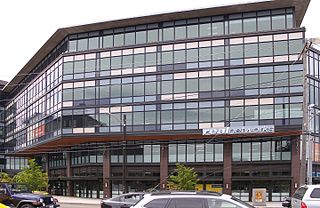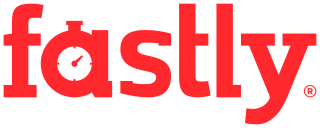
Streaming media is multimedia that is delivered and consumed in a continuous manner from a source, with little or no intermediate storage in network elements. Streaming refers to the delivery method of content, rather than the content itself.

Akamai Technologies, Inc. is a global content delivery network (CDN), cybersecurity, and cloud service company, providing web and Internet security services. Akamai's Intelligent Edge Platform is one of the world's largest distributed computing platforms. The company operates a network of servers around the world and rents out capacity on these servers to customers who want their websites to work faster by distributing content from locations near the user. When a user navigates to the URL of an Akamai customer, their browser is directed by Akamai's domain name system to a proximal edge server that can serve the requested content. Akamai's mapping system assigns each user to a proximal edge server using sophisticated algorithms such as stable matching and consistent hashing, enabling more reliable and faster web downloads. Further, Akamai implements DDoS mitigation and other security services in its edge server platform.

A content delivery network, or content distribution network, is a geographically distributed network of proxy servers and their data centers. The goal is to provide high availability and performance by distributing the service spatially relative to end users. CDNs came into existence in the late 1990s as a means for alleviating the performance bottlenecks of the Internet as the Internet was starting to become a mission-critical medium for people and enterprises. Since then, CDNs have grown to serve a large portion of the Internet content today, including web objects, downloadable objects, applications, live streaming media, on-demand streaming media, and social media sites.
Speedera Networks, founded in 1999, was a content delivery network (CDN) company that emerged in the late 1990s to advance technology applications for Internet communications and collaboration and became the first CDN to turn a profit. On June, 2005, Akamai acquired Speedera Networks.
Limelight Networks is an American company that provides a content delivery network (CDN) service, used for delivery of digital media content and software. As of February 2020, the company's network has more than 130 points-of-presence and delivers with 70+ Terabits per second of egress capacity across the globe.

Highwinds Network Group, Inc. (Highwinds) is a company that was founded in 2002 and offers IP services including CDN, cloud storage, IP transit, transport and colocation. The company headquarters are located in Winter Park, Florida, United States. Highwinds maintains Network Operations Centers (NOCs) in Winter Park, FL, Phoenix, AZ, and Amsterdam, Netherlands as well as offices in Costa Mesa, CA, São Paulo, Brazil and London, England. The Highwinds network, called RollingThunder, consists of more than 70 points of presence throughout North America, South America, Europe, Asia and Australia. Highwinds provides video streaming services to media companies including Blip.TV and Hudl, delivers online games for publishers such as Valve and CCP Games and distributes advertising assets for leading platforms including Facebook's LiveRail.
AWS Elemental, formerly known as Elemental Technologies, is a software company headquartered in Portland, Oregon and owned by Amazon Web Services that specializes in multiscreen video. Founded in August 2006, Elemental creates software that performs video encoding, decoding, transcoding, and pixel processing tasks on commodity hardware for adaptive bitrate streaming of video over IP networks. Elemental video processing software runs in turnkey, cloud-based and virtualized deployment models. The company has offices in the United States, the United Kingdom, France, Hong Kong, Singapore, Japan, China, Russia, India and Brazil.
Founded in 2004 in New York City, Pando Networks was a managed peer-to-peer (P2P) media distribution company backed by Intel Capital, BRM Capital and Wheatley Partners. The company specialized in cloud distribution of games, video and software for publishers and media distributors and also operated a freemium consumer business for sending large files.
CacheFly is a content delivery network (CDN) provider based in Chicago, Illinois with a 100% remote team. Way back in 1999 CacheFly started as Downloadhosting.com as a response to the need for high quality, reliable file distribution for small software developers, by CTO, Matt Levine.
Lumen Technologies is an American telecommunications company headquartered in Monroe, Louisiana, that offers communications, network services, security, cloud solutions, voice, and managed services. The company is a member of the S&P 500 index and the Fortune 500. Its communications services include local and long-distance voice, broadband, Multi-Protocol Label Switching (MPLS), private line, Ethernet, hosting, data integration, video, network, public access, Voice over Internet Protocol (VoIP), information technology, and other ancillary services. Lumen also serves global enterprise customers across North America, Latin America, EMEA, and Asia Pacific.

Cotendo, Inc. was a content delivery network and an application delivery network service provider. The company's headquarters are in Sunnyvale, California, with research and development based in Netanya, Israel. In March 2012, Akamai acquired Cotendo for over US$250 million.

RealNetworks, Inc. is a provider of artificial intelligence and computer vision based products. RealNetworks was a pioneer in Internet streaming media delivery software and services. They are based in Seattle, Washington, United States. The company also provides subscription-based online entertainment services and mobile entertainment and messaging services.
Adaptive bitrate streaming is a technique used in streaming multimedia over computer networks. While in the past most video or audio streaming technologies utilized streaming protocols such as RTP with RTSP, today's adaptive streaming technologies are almost exclusively based on HTTP and designed to work efficiently over large distributed HTTP networks such as the Internet. It works by detecting a user's bandwidth and CPU capacity in real time and adjusting the quality of the media stream accordingly. It requires the use of an encoder which can encode a single source media at multiple bit rates. The player client switches between streaming the different encodings depending on available resources. "The result: very little buffering, fast start time and a good experience for both high-end and low-end connections."
An over-the-top (OTT) media service is a media service offered directly to viewers via the Internet. OTT bypasses cable, broadcast, and satellite television platforms, the types of companies that traditionally act as controllers or distributors of such content. It has also been used to describe no-carrier cellphones, where all communications are charged as data, avoiding monopolistic competition, or apps for phones that transmit data in this manner, including both those that replace other call methods and those that update software.

MetaCDN is a cloud-based content delivery network company that also offers video transcoding, streaming video and web accelerator services.
Giraffic is a company that develops "Distributed Adaptive Storage & Streaming" (DASS) as well as had developed "Adaptive Video Acceleration” (AVA) software that attempted to improve the performance of streaming video. It sells primarily to OTT Video Apps Providers, as well as to Consumer Electronics Device Manufacturers, such as LG, ZTE and Samsung. According to TheMarker.com, Giraffic's AVA technology was acquired in 2019 by Roku, Inc. while the Company continues development of its DASS technology towards distributed storage systems.

go90 was an American Internet television service and mobile app owned and operated by Verizon Communications. The service was positioned as a mobile-oriented "social entertainment platform" targeted primarily towards millennials, featuring a mixture of new and acquired content from various providers. The service was available exclusively within the United States, although as of March 2018 some of its content became available internationally via Tumblr.

Dacast Inc. is a live streaming online video platform that allows businesses to broadcast and host live and on-demand video content as well as offer free or paid programming.

Fastly is an American cloud computing services provider. It describes its network as an edge cloud platform, which is designed to help developers extend their core cloud infrastructure to the edge of the network, closer to users. The Fastly edge cloud platform includes their content delivery network (CDN), image optimization, video and streaming, cloud security, and load balancing services. Fastly's cloud security services include denial-of-service attack protection, bot mitigation, and a web application firewall. Fastly web application firewall uses the Open Web Application Security Project ModSecurity Core Rule Set alongside its own ruleset.









